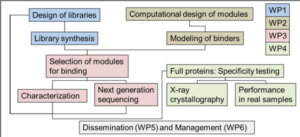The fundamental objective of the project is to change the way how binding proteins are generated.
For forty years, biological research has relied on monoclonal antibodies (mAbs) to detect biomolecules with-in medical diagnostics and basic life science research (reagent antibodies are not used in therapy, rather, they are used in vitro to detect biomolecules in virtually all biological and biomedical research, and also in clinical diagnostics). Without them, detection of disease-state biomarkers would be impossible and indeed, much fundamental life science research is absolutely dependent on mAbs. Yet unfortunately, it has become more and more evident that many mAbs are not nearly as specific as presumed, many mAbs are very poorly characterized and their production is based on unstable cell lines. In fact, about half of the commercial reagent mAbs have been shown to not function correctly.
The present project will solve this problem by the creation of protein modules, specific for very short stretches of peptide chains, from which modular binders (whole proteins) can be assembled.
The project will combine advances from protein design, evolutionary protein engineering, design of highly specified DNA libraries, advances from structural biology to enable the creation of such novel proteins.


